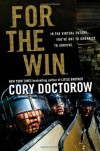Currently reading
Doomsday Book
Psychotic Reactions and Carburetor Dung
Book of Shadows
Wastelands: Stories of the Apocalypse
For the Win
Zone One: A Novel
 Really helpful go-to book to have around with your first baby. Every time something has been wrong, we've looked it up in here and either found relief or good advice for a course of action.
Really helpful go-to book to have around with your first baby. Every time something has been wrong, we've looked it up in here and either found relief or good advice for a course of action.
 Though I no longer remember what caused me to buy Tom Lutz's 2006 book Doing Nothing, it isn't hard to make an educated guess. As someone who cultivates a lifestyle that involves as little work in the classic sense (company, boss, white office, desk) as I find financially possible, it was likely the call of the kindred spirit, the desire to see this sort of lifestyle through somebody else's glasses. And yet, the title felt irksome. Doing nothing? It is not a state to which I aspire. (Is it even possible to literally do nothing?) I don't work much, as I said, in the classical sense, but "doing nothing" would be a inaccurate description of what fills my days. What does it mean to do nothing? What does it mean to work?
Though I no longer remember what caused me to buy Tom Lutz's 2006 book Doing Nothing, it isn't hard to make an educated guess. As someone who cultivates a lifestyle that involves as little work in the classic sense (company, boss, white office, desk) as I find financially possible, it was likely the call of the kindred spirit, the desire to see this sort of lifestyle through somebody else's glasses. And yet, the title felt irksome. Doing nothing? It is not a state to which I aspire. (Is it even possible to literally do nothing?) I don't work much, as I said, in the classical sense, but "doing nothing" would be a inaccurate description of what fills my days. What does it mean to do nothing? What does it mean to work?Most often, doing nothing is defined as the opposite of working, and working is defined as doing something that involves monetary payment. So when I write things that may never be published by an outside vendor or that will be published but without payment, am I doing nothing? When I take care of my daughter am I doing nothing? When I build something or attend a demonstration or read or research or create am I doing nothing? Why should activities involving financial renumeration hold a monopoly on the term work?
What I didn't expect to find in Lutz's book was a serious, thoughtful, well-researched history of folks, well, like me. (If he'd written his book a little later he would certainly have had to mention New Escapologist.) People who were at odds with the current take on work. People who wanted to paint pictures instead of get regular jobs. People who wrote extensively about the idle life (and whose activities very plainly expose them as the opposite of idle). Beats and slackers and philosophers and artists. Seeing myself—the way I live my life and the ideals I write about—as a tiny dot on a long historical timeline of idlers provided an interesting perspective. Who are we, where are we, and what will history make of out moment?
In the last five years or so, trading in the corporate work world for early retirement and a more exciting life on smaller means has become a trend large enough to earn it a place in any future printing of Lutz's book. Some travel, some stay at home to meditate and revel in the small pleasures of books and long walks, some attempt agricultural self-sufficiency (which is about as far from doing nothing as you can get). Aside from the homesteaders who are working their asses off making their living in a very literal sense, the rest of us are living lives about as far from reality as you can get. I'm not saying that reality involves any sort of desk work, but if you consider our basic need for food and shelter and the work it takes to make those things happen the basis of our reality, the desire to work less and meditate more only serves to alienate us further from a life that would bind us to our own lifeblood in a meaningful way. It does not change my mind about how I have chosen to live within my particular context, but I do imagine that through the eyes of people living in a way that I currently perceive as ideal, we, I, would look utterly ridiculous. Then again so would almost all of our other options to "work."
Lutz comes to the conclusion that doing nothing is part of a balance. The more work-obsessed a culture becomes, the stronger the slacker figures within that culture. At the end of the day, according to Lutz's research, the work ethic doesn't really exist. "The history of slackers is the history not just of our distaste for work and our fantasies of escaping it (as well as the history of our vilification of those who do escape it) but also a history of complexly distorted perceptions. One man's welfare queen is another man's struggling mother. One man's slacker son may be preparing his arrival as an artist..." People have a tendency, even when they are splitting the work 50/50, to assume that they are doing more than their fair share, and the other less. I have felt and witnessed the phenomenon myself in communal kitchens. Maybe slackers don't really exist either, are simply a phantom of our own perception that we are doing more than everybody else.
This was originally published on www.clickclackgorilla.com.
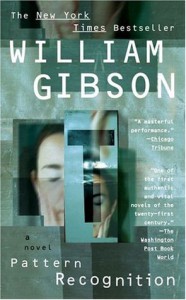 William Gibson keeps popping up in my life this year. I reread Neuromancer and felt mildly disappointed. Why had I liked this book so much again? Then I stumbled upon Gibson's recently published book of essays [b:Distrust That Particular Flavor|11890817|Distrust That Particular Flavor|William Gibson|http://d.gr-assets.com/books/1348841998s/11890817.jpg|16849819] and was completely inspired, ready to read everything else he'd ever written. Which brought me to Pattern Recognition. And it was gripping and exciting and well written and I was so absorbed that I ended up staying up until four am just to find out how it was all going to turn out. Quite an enjoyable read. Really believable and enjoyable female lead character. And when I was reading I was really, totally gone. No longer even in the room. It sucked me right in, and didn't spit me back out again for hours after I had finished, instead leaving me wired and excited and dreaming of the footage.
William Gibson keeps popping up in my life this year. I reread Neuromancer and felt mildly disappointed. Why had I liked this book so much again? Then I stumbled upon Gibson's recently published book of essays [b:Distrust That Particular Flavor|11890817|Distrust That Particular Flavor|William Gibson|http://d.gr-assets.com/books/1348841998s/11890817.jpg|16849819] and was completely inspired, ready to read everything else he'd ever written. Which brought me to Pattern Recognition. And it was gripping and exciting and well written and I was so absorbed that I ended up staying up until four am just to find out how it was all going to turn out. Quite an enjoyable read. Really believable and enjoyable female lead character. And when I was reading I was really, totally gone. No longer even in the room. It sucked me right in, and didn't spit me back out again for hours after I had finished, instead leaving me wired and excited and dreaming of the footage.
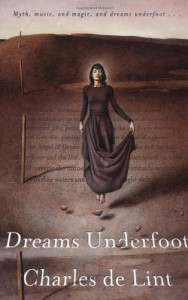 Dreams Underfoot is truly magical. Modern folk tales turned fairy tales about everyday magic, the magic in the everyday, and with the recurring theme that you have to believe to see the world as it really is. Though I was at first disappointed to discover that this was a collection of short stories rather than a novel, they are so tightly interwoven that the feel was not in any way disjointed, and my attention span flowed neatly from one segment to the next.
Dreams Underfoot is truly magical. Modern folk tales turned fairy tales about everyday magic, the magic in the everyday, and with the recurring theme that you have to believe to see the world as it really is. Though I was at first disappointed to discover that this was a collection of short stories rather than a novel, they are so tightly interwoven that the feel was not in any way disjointed, and my attention span flowed neatly from one segment to the next.
 I am an obsessive Philip K Dick fan. But this short story collection (all very early works) is his worst. Usually I fly through his novels and stories, propelling by the Dickian drive so peculiar to most of his writing. This collection I slogged through, just waiting for it to end. I am glad that someone actually published it though, as it paved the road for what was to come later. Interesting to someone looking to really know all of his work, but not a worthwhile read for the passerby.
I am an obsessive Philip K Dick fan. But this short story collection (all very early works) is his worst. Usually I fly through his novels and stories, propelling by the Dickian drive so peculiar to most of his writing. This collection I slogged through, just waiting for it to end. I am glad that someone actually published it though, as it paved the road for what was to come later. Interesting to someone looking to really know all of his work, but not a worthwhile read for the passerby.
 I picked this book up on a whim. I had read Gibson's Neuromancer and enjoyed it, but wasn't obsessed. But this book! It left me inspired, full of ideas, raging to write. Though he occasionally seems to be uncomfortable with the essay format, he has many insightful, weird, interesting things to say in these essays. Now I think it's time to go back and read all of his other work. Really great read. Not neccessarily just for fans of science fiction.
I picked this book up on a whim. I had read Gibson's Neuromancer and enjoyed it, but wasn't obsessed. But this book! It left me inspired, full of ideas, raging to write. Though he occasionally seems to be uncomfortable with the essay format, he has many insightful, weird, interesting things to say in these essays. Now I think it's time to go back and read all of his other work. Really great read. Not neccessarily just for fans of science fiction.
 It took me years of recommendations to read this and now I have and I can't believe I waited so long. Excellent read. So much in the PA genre (or dystopian) is more about the story than the writing, but here both are absolutely beautiful.
It took me years of recommendations to read this and now I have and I can't believe I waited so long. Excellent read. So much in the PA genre (or dystopian) is more about the story than the writing, but here both are absolutely beautiful.
 I keep hearing this book referred to as "satire," but it felt a lot more like a 1984 or a Brave New World. Dystopian, and yet far too near the truth to be considered as such.
I keep hearing this book referred to as "satire," but it felt a lot more like a 1984 or a Brave New World. Dystopian, and yet far too near the truth to be considered as such.This was a really enoyable read. Anderson creates a new slang that doesn't bog down the story or the writing, which is one of the most interesting bits of the writing. The story is simple, but gripping. Part of me wished that it went a little bit further with rebellion than it did, but the message remains as poignant.
 So. Before I start throwing around praise and rebuke, you should know something about my reading habits. I don't like to read about real people. Well, not in fiction. If I want to read about real people I read nonfiction. If I want to read fiction I read bizarro out there fiction. I don't usually like reading close-to-life stories about multiple generations and sadness and etc. So.
So. Before I start throwing around praise and rebuke, you should know something about my reading habits. I don't like to read about real people. Well, not in fiction. If I want to read about real people I read nonfiction. If I want to read fiction I read bizarro out there fiction. I don't usually like reading close-to-life stories about multiple generations and sadness and etc. So.This book was really well written. There was some excellent writing, though none of the kind that has me raving with excitment. It took me almost 350 pages to get into the story, and I considered giving it up more than once. See, I was in it for the narrator's story, the story of a person dealing with complex gender issues. But instead the majority of the book deals with the narrator's family. They became interesting to me eventually, but it just wasn't what I was looking for or interested in reading. Fortunately, the narrator's own story becomes much more prominent in the last 100 pages, and those flew. I was hoping for a really epic mind-blowing ending to make all the hype this book has received more meaningful, but it never came.
A solid book, but not one I will ever read again or will necessarily recommend to others.
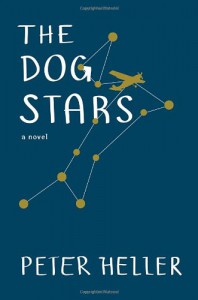 "A novel about the end of the world which makes you glad to be alive." That is what it says on the cover of my edition. They had my at "end of the world," but "glad to be alive"? How was a novel about the end of the world going to make me feel glad to be alive? Now? With this earth-destroying, soul-sucking system in place? With corporations pushing through legislation to ban the labeling of GMO foods? With people being arrested because of the books they own? With pollution and more pollution and even more pollution? With factory farming and mountain-top removal and Mitt Romney? Oh wait, maybe a novel about the end of the world is just what would make me feel glad all over.
"A novel about the end of the world which makes you glad to be alive." That is what it says on the cover of my edition. They had my at "end of the world," but "glad to be alive"? How was a novel about the end of the world going to make me feel glad to be alive? Now? With this earth-destroying, soul-sucking system in place? With corporations pushing through legislation to ban the labeling of GMO foods? With people being arrested because of the books they own? With pollution and more pollution and even more pollution? With factory farming and mountain-top removal and Mitt Romney? Oh wait, maybe a novel about the end of the world is just what would make me feel glad all over.So I bought it. The Dog Stars by Peter Heller. Even though I hated the title. Even though I wasn't entirely certain that this author wasn't also the author of a lot of bad crime novels. (He wasn't.) Buying a book on a whim is a calculated risk. I don't like to keep books around that I won't read again and again, and I don't like spending money on things I don't really need. But I had a gift certificate. I took the risk; I played the lotto. And I won, I won!
The Dog Stars is your classic post apocalypse (PA) story. It is nine years out, and a few survivors are doing their rather lonely thing. Some things are broken. (Note to future PA-book-writing self: Heller mentions automobile gas going "stale" i.e. unusable after a few years. True or false?) Some things are not. This book's two star survivors, Hig and Bangley, happen to have a whole solar-powered airport as their batcave. Besides being attacked from time to time, they seem to have the whole survival thing down. Hig even has a working plane. I suppose it is all plausible enough.
While the book was a fun and quick read, with a sparse, easy-to-swallow style, the author is a real subject of interest. The Dog Stars is Heller's first novel. Usually he spends his time doing totally fucking nutso white water rafting trips, doing "adventure writing," and secretly filming assholes who are (were?) murdering a lot of dolphins in Japan (The Cove). He built an off-grid adobe house in the middle of nowhere. He certainly sounds like a man who is ready for whatever is coming, and it all felt like street cred that stood behind the book, making it stronger.
At the end of the story, some crazy shit happens and some nice shit happens. And did I feel good about being alive? I mean, I guess I don't ever actually feel bad about being alive, but the thought that a book was going to create a deluge of posi-ness was going a bit far. Sounded a bit cheesey. Well, it was. Cheesey. It was. Impossible. But I really enjoyed the book, and the ending was fun and made me feel just fine. Particularly as it involved a world that no longer contained a lot of the bullshit that makes me ache with sorrow for ours. And maybe that is exactly what they meant.
Originally published at www.clickclackgorilla.com
 Another enjoyable Bryson read. Funny, though not as funny as Notes From a Small Island or I'm a Stranger Here Myself. At times plodding. But informative, interesting, and really successful in making me happy to be living somewhere where the wildlife is quite a bit less lethal.
Another enjoyable Bryson read. Funny, though not as funny as Notes From a Small Island or I'm a Stranger Here Myself. At times plodding. But informative, interesting, and really successful in making me happy to be living somewhere where the wildlife is quite a bit less lethal.
 Another enjoyable Bryson read. Funny, though not as funny as Notes From a Small Island or I'm a Stranger Here Myself. At times plodding. But informative, interesting, and really successful in making me happy to be living somewhere where the wildlife is quite a bit less lethal.
Another enjoyable Bryson read. Funny, though not as funny as Notes From a Small Island or I'm a Stranger Here Myself. At times plodding. But informative, interesting, and really successful in making me happy to be living somewhere where the wildlife is quite a bit less lethal.
 My first Didion read, and what a pleasure it was. Her style is interesting, both of weaving words and stories. The tale here was incredibly gripping--enough so that I read it in a day and a half. Looking forward to seeing more of her work.
My first Didion read, and what a pleasure it was. Her style is interesting, both of weaving words and stories. The tale here was incredibly gripping--enough so that I read it in a day and a half. Looking forward to seeing more of her work.
 I am a huge fan of many of Ursula LeGuin's novels, so I picked up this collection of short stories with excitement. But. Alas! There were very few tales inside that really got to me. The first story, "The Author of the Acacia Seeds," was absolutely brilliant, the kind of fantasy writer meets anthropoligist stuff that really gets you looking at the world from another angle. But many of the stories didn't have the science fiction touch that keeps me reading her other works, and I had to trudge through them. Not that any of them are poorly written, just not for me, particularly as someone who generally has a hard time getting into any sort of short stories.
I am a huge fan of many of Ursula LeGuin's novels, so I picked up this collection of short stories with excitement. But. Alas! There were very few tales inside that really got to me. The first story, "The Author of the Acacia Seeds," was absolutely brilliant, the kind of fantasy writer meets anthropoligist stuff that really gets you looking at the world from another angle. But many of the stories didn't have the science fiction touch that keeps me reading her other works, and I had to trudge through them. Not that any of them are poorly written, just not for me, particularly as someone who generally has a hard time getting into any sort of short stories.
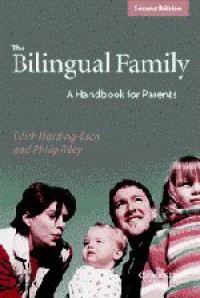 I was looking for a practical manual to raising bi-lingual children. Tips and tricks, that sort of thing. And so I found myself lagging through the first third of the book. There were a few tips, but most of the information was highly academic. Then AT LAST, came a lot of really, really useful information, as well as detailed descriptions of bilingual families and how they handled their situation. A worth while read for anyone considering raising their children bilingually.
I was looking for a practical manual to raising bi-lingual children. Tips and tricks, that sort of thing. And so I found myself lagging through the first third of the book. There were a few tips, but most of the information was highly academic. Then AT LAST, came a lot of really, really useful information, as well as detailed descriptions of bilingual families and how they handled their situation. A worth while read for anyone considering raising their children bilingually.
Nighttime Parenting (Revised): How to Get Your Baby and Child to Sleep
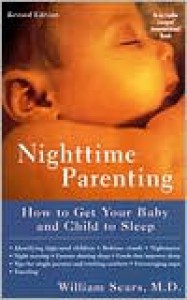 This book is a good introduction to attachment parenting, and treatise on the path of least resistance and pains-in-the-ass for nighttime parenting. It is a bit repetitive (as if Sears wrote each of the chapters separately, or assumed readers would, including bits of information over and over in each, to make sure no one misses a thing). I tend to agree with Dr. Sears' principles, but, as in all of his books, he is extremely hetero-centric. I have never read a statement by him on same-sex couples parenting, but he tends to throw the "the father is very important" line around quite freely. This is positive in that it encourages fathers who think they get time off when they get home from work to get off their asses and do their fair share of parenting, but it also tends to sound like he might be the type to say that a lesbian couple couldn't do it for a kid the way a man-woman couple could. He is devoutly Christian as well, though he tends to do a decent job of keeping his religion out of his book, and he is very keen on the sacredness of marriage. However, as a spokesperson for attachment parenting, he's a very fine mouthpiece.
This book is a good introduction to attachment parenting, and treatise on the path of least resistance and pains-in-the-ass for nighttime parenting. It is a bit repetitive (as if Sears wrote each of the chapters separately, or assumed readers would, including bits of information over and over in each, to make sure no one misses a thing). I tend to agree with Dr. Sears' principles, but, as in all of his books, he is extremely hetero-centric. I have never read a statement by him on same-sex couples parenting, but he tends to throw the "the father is very important" line around quite freely. This is positive in that it encourages fathers who think they get time off when they get home from work to get off their asses and do their fair share of parenting, but it also tends to sound like he might be the type to say that a lesbian couple couldn't do it for a kid the way a man-woman couple could. He is devoutly Christian as well, though he tends to do a decent job of keeping his religion out of his book, and he is very keen on the sacredness of marriage. However, as a spokesperson for attachment parenting, he's a very fine mouthpiece.




